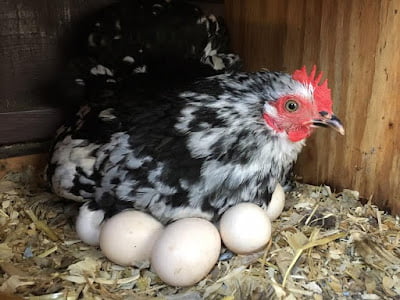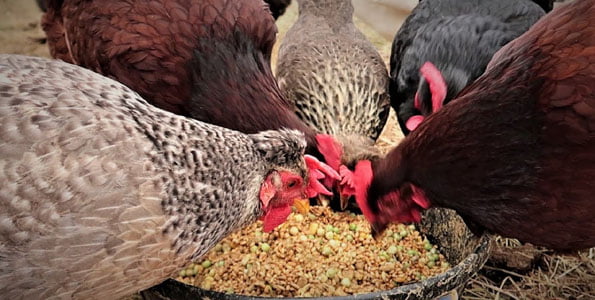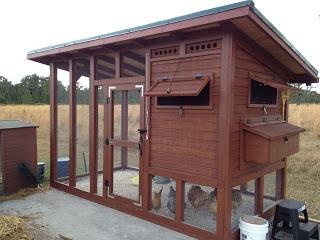A decrease in the number of eggs produced per day in your laying hen farm is one of the signs that there is a problem in your chicken flock. According to research conducted by the FAO, a hen that has reached the age of five or six months and is continuing should normally lay one egg every 24 to 26 hours, meaning that your hen should lay one egg every day.
Just as we carefully monitor chicken droppings to detect if a chicken is sick or has a problem, we should also monitor egg production daily. Changes in egg production can be caused by diseases, behavioral changes, environment and stress. To know the exact reason that changes egg production in your chicken group (flock) it is necessary to go back and review the history of your flock and also check the condition of all the chickens (physical assessment) while asking yourself the following questions;-
· Have you added any new or foreign chickens to your flock? Because foreign chickens can be a source of disease if they come from an area where there is a disease outbreak.
· Are there any changes in the type of food you are feeding them, changes in housing (pen) or layout within the pen, changes in weather, hours of light and darkness, changes in feces?
· Are there any signs of the presence of predators or diseases of chickens? Sometimes you may think that a chicken is not laying eggs, but it is not true, but there are animals like cats, dogs and rabbits that eat eggs without you knowing.
After asking such questions, the exact cause of this problem is often identified. The following are ten reasons that can cause egg production to decline in your laying hen flock.
1. REDUCTION IN LIGHTING HOURS.
Light stimulates the pituitary gland in chickens to stimulate egg production. A good egg-laying cycle in chickens requires 14 to 16 hours of light, for example, there are some seasons of the year when the sun sets and rises late, causing fewer hours of light per day, thus affecting egg production in chickens.
To overcome this problem of lack of daylight hours, you can put artificial lights in your laying hen’s house and turn them on after dark for two to three hours. According to research conducted by the FAO, giving your hens light for two to three hours can increase egg laying by 20 to 30 percent, which shows how important light is for laying hens.
2. STRESS AND VARIOUS CHANGES.
It is very easy for chickens to be affected by stress and this leads to reduced egg laying. Chickens usually do not like changes, it can be a change in food, the arrangement of food and water containers in the coop and being moved to another coop. Stress can also be caused by things like being bothered by worms, ticks, fleas, and lice, hot weather, the noise of animals like dogs or cats, the noise of machines or cars that do not stop, all of which can cause stress to chickens and ultimately affect egg laying.
3. DISEASES.
When a chicken is attacked by diseases, it often becomes weak and lacks physical strength and also loses its appetite. During this time, the chicken reduces its laying or stops laying completely depending on how the disease has affected it. To avoid these problems, make sure that the chickens are given all the resources they deserve, treat them in time when they get sick and also try hard to prevent sources of disease that are within your power as a farmer.
4. AGE OF THE CHICKEN
Usually when a chicken reaches the age of two, its egg production decreases, as it gets older, egg production decreases but they tend to lay larger eggs than younger chickens. To increase the profit and efficiency of your project, make sure that you remove mature chickens and bring in others that are not mature, because those older chickens may be eating a lot of food but not laying eggs, which causes losses on the farm.
5. LACK OF WATER
Access to clean and safe water is very important in the egg production system for chickens. Egg production is affected if your chickens do not drink enough water, perhaps because it is dirty, not placed in a place where it is easily accessible so the chickens cannot drink easily or the water does not have a real taste due to dirt or substances that have been mixed in it. Make sure that clean and safe water is available in the house at all times and placed in an accessible place and also make sure that the number of water containers meets the needs according to the number of your chickens.
6. TEMPERATURE.
The egg laying rate of a hen can be affected by the temperature in the environment. Usually, for a hen to continue laying at her normal rate of one egg per day, she needs a temperature that is not lower than 11 oC and not higher than 28 oC .
The table below shows the effects of different temperature levels on your chickens in production.
7. PROBLEMS IN THE REPRODUCTIVE SYSTEM
Genetic disorders or abnormalities in the reproductive system can also cause a decrease in egg production, so make sure your laying hen does not have any genetic problems. Seek veterinary advice if your hen appears to be swollen or distended, like a water balloon in the lower abdomen, or if you notice any signs of an egg being stuck.
8. NUTRIENT DEFICIENCY.
Lack of essential nutrients in the diet of laying hens causes a decrease in egg production. Make sure that your hens are fed a diet that contains all the nutrients that are important to them. To eliminate this problem, you can buy food from stores that has been specially formulated with nutrients suitable for laying hens or to reduce costs, you can learn various food mixture formulas and make your own food for your hens. In the laying hen diet, make sure that there is an adequate amount of protein, minerals, calcium and carbohydrates.
9. MOLTING.
This is a natural behavior that occurs in chickens at various stages of growth. Some chickens may molt many feathers at once, leaving some parts of their body bare, such as their back and neck, or they may molt a little while others grow, making it difficult for you to detect if they are in this stage of molting.
During this period, the hen reduces or completely stops laying, this is due to the fact that during this period the hen uses more protein and energy to grow new feathers in her body than to produce eggs. This situation is natural and cannot be prevented. What is required during this period is to strive to give her food that is good (balanced diet).
10. STATE OF DESIRE .
This is the condition of the hen laying her eggs to keep them warm and allow the development of the embryo inside the egg. This condition is common in our native chickens. When the hen starts laying, she stops laying eggs, also if the hen that is laying is in a coop where other hens are still laying, it leads to other hens experiencing this condition only when they see her laying. Therefore, it is better for the hens that are laying not to stay in the same coop with those that are still laying.
NOTE:
TO SEE A BIG CHANGE IN YOUR CHICKENS’ EGG PRODUCTION, IT IS BEST TO TAKE ACTION TO ADDRESS ALL OF THE ABOVE OBSTACLES. DON’T CHOOSE ONE PROBLEM TO SOLVE, MAKE SURE YOU SOLVE ALL OF THEM AT THE SAME TIME AND YOU WILL SEE GOOD RESULTS.
…………………………………………………………………………………………





